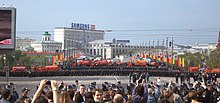Protests after the 2012 Russian presidential election
The protests after the Russian presidential elections in 2012 , after the local elections in March 2012 and after the inauguration of Vladimir Putin as president on May 6, 2012 are demonstrations against alleged election fraud in the presidential elections of March 6, 2012 in Russia . They began in March 2012 and - together with the protests after the parliamentary elections from December 2011 - led to the largest protest rallies in the country's recent history. The police responded to all rallies with large numbers.
Protests after the local elections in Russia in March 2012
Astrakhan
In Astrakhan on March 6, 2012, United Russia's candidate Mikhail Stolyarov was elected mayor. His opponent was Oleg Schein from Just Russia . Presumably this mayoral election was massively falsified, even the Central Russian Electoral Authority under the leadership of Vladimir Churov admitted dozens of "procedural errors". Dozens of violations of the legal procedure were recorded by the web cameras installed in connection with the presidential election, others by election monitors with their digital cameras and voice recorders.
In response to the massive irregularities, candidate Oleg Schein went on a hunger strike that lasted several weeks. After some time, Oleg Schein's struggle for just and fair elections in Astrakhan was taken up by the political actors of the opposition in Moscow , who first organized several support rallies in Moscow and finally traveled to Astrakhan in mid-April 2012 to support Oleg Schein in his struggle. Those who traveled to Astrakhan included Roman Dobrochotov , Alexei Navalni, Ksenia Sobchak, Danila Lindele, Gennady Gudkov, and others.
On April 15, the largest demonstration in more than 15 years took place in Astrakhan, over 10,000 citizens of Astrakhan and several hundred people from other cities in Russia strolled through the city at a rally. Oleg Schein then managed to get the head of the electoral authority, Churov, to look at the video recordings that were supposed to prove the forgeries with him. However, despite violations of the electoral law, Churov saw no reasons that would justify the repeal of the election. Schein ended his hunger strike at the end of April and filed a complaint in Astrakhan.
Lermontov
In Lermontow , southern Russia , protests against local elections took place as early as mid to late February 2012, as dozens of candidates were not allowed to vote. At one point more than 50 people were on hunger strike.
Protests before and after Putin's inauguration in May 2012
After Putin's inauguration in May 2012, massive protests broke out again in central Moscow. On the day before the inauguration on May 6, 2012, two approved rallies took place in Moscow under the slogan “We will not let the impostor in the Kremlin”. Tens of thousands of demonstrators gathered; however, many participants were not allowed to the meeting place - Bolotnaya Square in Moscow. As a result, there was - probably loyal to the regime provocateurs staged - excesses of the OMON -Sondereinheiten after some "protesters" had tried the large contingent of OMON, the access to the Great Stone Bridge barricaded to no protesters near the Kremlin to let attack.
As a reaction to the brutal reaction of the police units, spontaneous rallies, meetings and walks without political slogans took place from the day Putin was inaugurated. Since May 7th, hundreds of people have marched through Moscow all night, often followed by OMON units. At times they settled on Staraya ploshchad (Old Square) in Kitai-Gorod and slept there on camping mattresses in sleeping bags. After a while, Alexei Navalni and Sergei Udalzow joined the protesters. However, they were arrested by the police and sentenced to 15 days in prison for "defying state authority". The protest scene has meanwhile shifted to the Chistyje Prudy . Also under the impression of the "Occupy" movement, the occupation of the Chistyje Prudy Park in the vicinity of the monument to the Kazakh poet Abaj was announced - "OccupyAbai". Hundreds of protesters spent nights in Chistyje Prudy Park. Ilya Yashin took over the organizational management of the protest camp . Open seminars were held on democracy, citizens' movements and civil society, but also tango courses and photo workshops with prominent bloggers and photographers. All events and details were updated in real time on Twitter .
On May 13, 2012, a control walk initiated by the writer Boris Akunin took place. Here writers gathered to clarify whether freedom of assembly would allow them to stroll freely through their own city, Moscow, without political slogans and posters. Lyudmila Ulitskaya, Leonid Zorin, Dmitri Bykov and others joined the walk. Surprisingly, over 10,000 participants joined the march; Together they marched from the Pushkin memorial on Pushkin Square to the Griboyedov memorial in Chistye Prudy Park, where they met with the participants of “Occupy Abai”.
Lawsuits and convictions
A total of 29 people were sentenced to long prison terms or imprisonment in a camp. Observers called the trial against the leaders a political trial, the defense lawyers called it a "show trial".
See also
Web links
Individual evidence
- ↑ http://www.eng.kavkaz-uzel.ru/articles/20258/
- ↑ - ( Memento of the original from May 14, 2012 in the Internet Archive ) Info: The archive link has been inserted automatically and has not yet been checked. Please check the original and archive link according to the instructions and then remove this notice.
- ^ Camp detention for opponents of the Kremlin after Putin protests , Die Welt, July 24, 2014
- ↑ Opponents of the Kremlin must be held in camp after protests against Putin , Tages-Anzeiger, July 24, 2014

